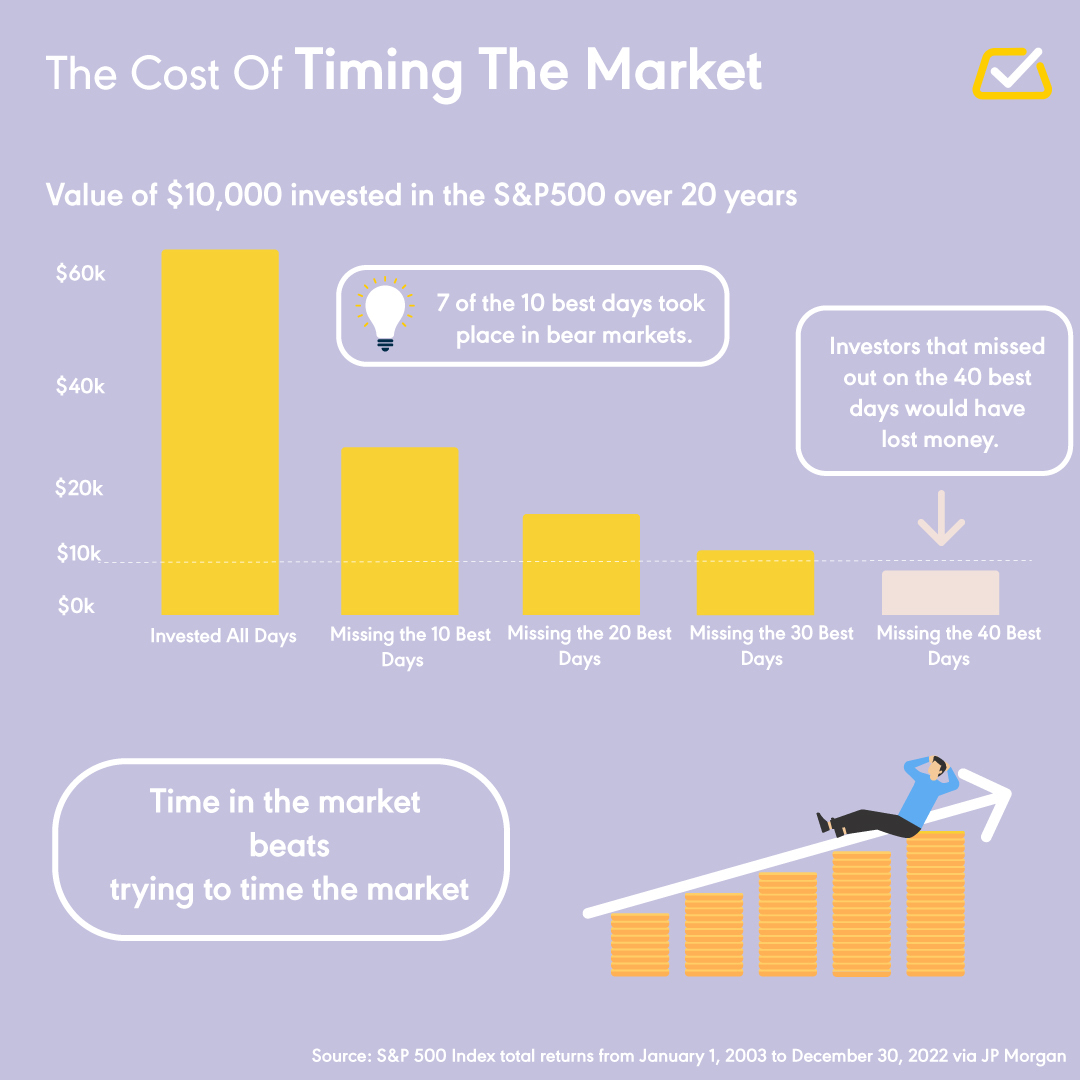An Introduction to Passive Investing: Building Wealth the Steady Way

Tired of exchanging hours for dollars?
Do you want to earn money whilst you sleep?
There's a way your money can work for you instead of you just working for money (i.e. through a job where you get paid for the time you work).
Enter passive investing.
Passive investing is where you invest your money in a diversified portfolio of assets to track the performance of a market index such as the S&P 500 or HLAL (for halal¹-conscious investors).
The idea is that passive investing runs on autopilot in the background, quietly growing your wealth without any active effort from you.
What exactly is Passive Investing?
Passive investing is an investment strategy that involves buying and holding a diversified portfolio of assets to track the performance of a market index or a specific asset class. For example, Wahed enables Muslims to invest in a diversified portfolio that tracks the performance of Shariah-compliant assets.
This strategy is built on the belief that over the long term markets tend to appreciate in value. Your job as an investor is to stay invested to benefit from this appreciation instead of trying to beat the market through frequent trading or stock picking.
Passive investing is like hopping on a train that's slowly chugging uphill. The idea is you enjoy the ride and watch your money grow over time.
Key Principles of Passive Investing
There are three key principles of passive investing that you want to follow to increase your chances of success when investing passively:
1. Diversification
Diversification is a fundamental principle of passive investing. Diversification is when you spread your investments across various asset classes and sectors to avoid the dangers of over-concentration.
For example, if all of your investments are in property and the property market crashes, your entire portfolio will be in trouble. It would have been safer to spread your money across different areas.
This is why shariah-compliant passive investment providers such as Wahed give their clients access to global and emerging markets stocks, gold and sukuks.
2. Minimized Costs
Passive investors typically choose low-cost investment options, such as index funds or exchange-traded funds (ETFs). These funds aim to replicate the performance of a specific market index, and because they are not actively managed, they come with lower management fees and expenses.
As you’re not constantly trading in and out of investments, you save a lot of money on transaction costs. This is important because every dollar you spend on investing costs is a dollar less you have to grow over time.
Over the long term, even seemingly small fees can substantially erode returns due to the power of compound returns.
3. Long-term Mindset
Passive investing is a long-term strategy where investors commit to holding their assets for years, if not decades. This approach aligns with the belief that, over time, the market tends to move upwards, even with short-term fluctuations.
The key idea is that you want to stay invested in the market instead of trying to time the market which could lead you to miss out on the best periods of growth. The data backs this up as well as you can see from the below graphic.

If you kept $10,000 invested for the full 20 years, your investment would be worth $64,844, a return of 648%. If you missed the ten best days (the days with the highest return), your return after 20 years would be $29,708, a return of 297%. So the impact of missing out on those 10 days is approximately $35,000!
The message is clear… stay invested.
Benefits of Passive Investing
A. Lower Costs
One of the primary advantages of passive investing is its cost-effectiveness. Since these strategies involve minimal trading and management, fees and expenses are substantially lower than active strategies. This is better for the investors as it means more of their money goes towards investing rather than the cost of servicing the investments.
B. Predictable Performance
Passive investments aim to replicate the performance of a specific index or asset class. This means that investors can reasonably predict how their investments will perform over time, as they closely mirror the market's overall movements.
Many passive strategies have demonstrated consistent and competitive performance over the long term. For example, the S&P 500 index, a popular benchmark for U.S. large-cap stocks, has historically shown steady growth.
C. Peace of Mind
Passive investing is less stressful and time-consuming compared to active trading. There is no need for constant monitoring or research, making it an excellent choice for individuals with busy lives or those who prefer a hands-off approach to investing.
Key Considerations
While passive investing has numerous advantages, it's not without its considerations and potential drawbacks:
- Market Risk: Passive investors are exposed to market fluctuations, and they must be prepared for the occasional bear market or downturn. A long-term perspective is crucial to weather such storms.
- Lack of Flexibility: Passive investors have limited control over their investments because they are committed to mirroring a specific index. They can't make quick adjustments to capitalise on emerging trends or opportunities.
However, passive investing advocates would argue that this is the point of passive investing anyhow. The idea is to pick a long-term strategy and stick with it instead of trying to catch the next big thing. - Limits your growth as an investor: When you are actively engaged in researching companies, evaluating financials, tracking markets, and deciding when to buy and sell stocks yourself, you build critical knowledge about investing.
As a counterpoint, the rationale behind passive investing is often either 1) recognising you don’t have the time or interest to effectively learn how to research and analyse stocks in-depth or 2) acknowledging that developing stock-picking skills that reliably beat the market is very difficult, even for professionals.
How Can Muslims Invest Passively?
You may be thinking that this sounds great but how can you make sure that this is all Shariah-compliant?
All you need to do is make sure that you invest in asset classes that are shariah-compliant only and avoid haram elements like riba (interest).
For passive investing, diversification is very important so you want to ensure that you invest in a diversified Shariah-compliant fund that only invests in a basket of Shariah-compliant companies and assets. This means avoiding businesses that engage in areas like gambling, adult entertainment, tobacco, and others which are obviously impermissible.
So, How Can You Get Started?
This is where we come in.
Wahed allows Muslims to invest their money in a diversified, low-cost and most importantly shariah-compliant way. We do this by investing your money into different investments that are matched to you, and that you feel comfortable with. Just choose your desired risk level and we’ll handle the rest.
All our investments are signed off by our Shari’ah board to ensure that all returns made are halal. That’s just one half of the equation. The other half is making sure your investments are invested in a way that actually grows your wealth and helps you to achieve the things you want in life.
Wahed has already helped 300,000 Muslims across the world to grow their wealth in a way that is in line with their faith and values. Check out the performance of our portfolios and the historical returns we have generated for our clients here.
To start your journey to halal investing and make your money work for you, sign up here.
1. The term 'Halal' denotes that it is permitted and follows Islamic law
Risk Warning: Equity investments are not readily realisable and involve risks, including loss of capital, illiquidity, lack of dividends and dilution, and it should be done only as part of a diversified portfolio. Investments of this type are only for investors who understand these risks. You will only be able to invest in the company once you have met our conditions for becoming a registered member.
Please visit www.wahed.com/uk/ventures/risk for our full risk warning.
Risk Warning: As with any investment, a Wahed Invest Ltd investment puts your money at risk, as the value of your investment can go down as well as up. The tax treatment of your investment will depend on your individual circumstances and may change in the future. If you are unsure about whether investing is right for you, please seek expert financial advice.
Please visit www.wahed.com for our full terms and conditions
Maydan Capital Limited, trading as WahedX, is registered in England and Wales (Company No. 13451691), registered office: 87-89 Baker Street, London, W1U 6RJ, UK. Maydan Capital Ltd (FRN: 963613) is an appointed representative of Wahed Invest Ltd (FRN: 833225), an authorised and regulated firm by the Financial Conduct Authority.Wahed Invest Ltd. is registered in England and Wales (Company No. 10829012), registered office: 87-89 Baker Street, London, W1U 6RJ, UK and is authorised and regulated by the Financial Conduct Authority: FRN 833225.
Subscribe For More Islamic Finance Content
As with any investment, a Wahed Invest Ltd investment puts your money at risk, as the value of your investment can go down as well as up. The tax treatment of your investment will depend on your individual circumstances and may change in the future. If you are unsure about whether investing is right for you, please seek expert financial advice.
Wahed Invest LLC (Wahed) is a US Securities and Exchange Commission (SEC) registered investment advisor. Wahed Invest provides brokerage services to its clients through its brokerage partner Apex Clearing Corporation, a member of NYSE - FINRA - SIPC and regulated by the SEC and the Commodity Futures Trading Commission. Registration does not imply a certain level of skill or training. Wahed does not intend to offer or solicit anyone to buy or sell securities in jurisdictions where Wahed is not registered or a region where an investment practice like this would be contrary to the laws or regulations. Any returns generated in the past do not guarantee future returns. All securities involve some risk and may result in loss. Any performance displayed in the advertisements or graphics on this site are for illustrative performances only.
Disclaimer: Wahed Technologies Sdn Bhd ("Wahed") is a Digital Investment Manager (DIM) licensee issued by Securities Commission Malaysia (eCMSL/ A0359/2019). It is part of Wahed Inc. Wahed is authorized to conduct a fund management business that incorporates innovative technologies into automated portfolio management services offered to clients under a license issued pursuant to Schedule 2 of the Capital Markets Services Act 2007. All investments involve risks, including the possibility of losing the money you invest, and the track record does not guarantee future performance. The history of returns, expected returns, and probability projections is provided for informational and illustrative purposes, and may not reflect actual future performance. Wahed is not responsible for liability for your trading and investment decisions. It should not be assumed that the methods, techniques, or indicators presented in this product will be profitable, or will not result in losses. The previous results of any trading system published by Wahed, through the Website or otherwise, do not indicate future returns by that system, and do not indicate future returns that will be realized by you.
Wahed Invest Limited is regulated by ADGM’s Financial Services Regulatory Authority (“FSRA”) as an Islamic Financial Business with Financial Services Permission for Shari’a Compliant Regulated Activities of Managing Assets and Arranging Custody [Financial Permission No. 220065]. Our ADGM Registered No. is 000004971.
Wahed assumes no obligation to provide notifications of changes in any factors that could affect the information provided. This information should not be relied upon by the reader as research or investment advice regarding any issuer or security in particular. Any strategies discussed are strictly for illustrative and educational purposes and should not be construed as a recommendation to purchase or sell, or an offer to sell or a solicitation of an offer to buy any security. Furthermore, the information presented may not take into consideration commissions, tax implications, or other transactional costs, which may significantly affect the economic consequences of a given strategy or investment decision. This information is not intended as a recommendation to invest in any particular asset class or strategy or as a promise of future performance.
There is no guarantee that any investment strategy will work under all market conditions or is suitable for all investors. Each investor should evaluate their ability to invest long term, especially during periods of downturn in the market. Investors should not substitute these materials for professional services and should seek advice from an independent advisor before acting on any information presented. Any links to third-party websites are provided strictly as a courtesy. We make no representation as to the completeness or accuracy of information provided at these websites nor do we endorse the content and information contained on those sites. When you access one of these websites, you are leaving our website and assume total responsibility and risk for your use of the third-party websites.







